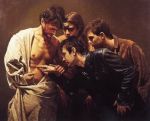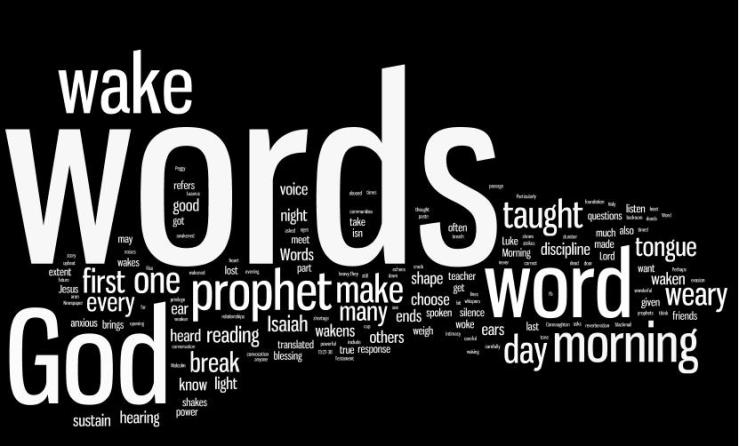A sermon for St John’s Day for St Alban’s, Broadheath

Is there anyone here named John …… or Jonathon, or Joan, or Jean, or Jeanette, or Janet, or Ian or Joanne or Johnson, or Jones ……?
We light a candle to you today, because it is your name day – it is St John’s Day.
Do you know what the name means?
It’s from the Hebrew, Yohanan, which means “Yahweh is gracious”.
What a lovely name to carry. (I often wonder how our names shape our outlook and who we are.)
John is the one (and there could be several people rolled into one – but let’s not complicate things too much), John is the one who proclaims Jesus as the Word made flesh, the Light of the world, and who was “the disciple Jesus loved”. He was one of the sons of Zebedee, follower of Jesus, with Jesus at the Transfiguration, with Jesus at the Last Supper, with Jesus in his agony in the garden, with Jesus and his mother at the foot of the cross, with Jesus as a witness of the resurrection and was with Jesus in the church in the proclamation of his gospel.
There is no birth story in John’s gospel. There’s no Bethlehem, Nazareth, shepherds, wise men or baby Jesus. Simply and wonderfully John begins his gospel:
In the beginning was the Word, and the Word was with God, and the Word was God. He was in the beginning with God. All things came into being through him, and without him not one thing came into being. What has come into being in him was life, and the life was the light of all people. The light shines in the darkness, and the darkness did not overcome it.
That is a birth story of a different kind.
And the Word became flesh and lived among us.
That’s a different way of telling the story of Jesus’ birth

One of our most favourite paintings is the painting by Holman Hunt of the Light of the World – which pictures Jesus standing at the door of our dark lives, knocking. Holman Hunt painted the picture – John gave us the picture: a picture of the light which shines in the darkness – a picture of hope, warmth and tenderness.
As John talks about the Light of the world he talks about seeing. Time and again there is the invitation in his gospel “Come and see”. While the people in Matthew’s gospel are divided as sheep and goats, in John’s gospel the division is between those who see and those who don’t see.
Those who see don’t just see with their eyes. They see with their hearts. John uses three different words for seeing. There’s the seeing with the eyes, as in John 20:1 when Mary Magdalen went to the tomb and SAW that the stone had been moved from the tomb. That was something she noticed, that she saw with her eyes.
A little later in that same chapter (John 20:4) Peter looks into the tomb and sees the linen wrappings there. John uses a different word for seeing – it’s a seeing with the mind as when we say “the penny dropped”. It began to dawn on Peter. He began to understand what had happened.
Then finally, just a few verses on in that chapter, 20:8, the other disciple, the one Jesus loved, went in the tomb. “He saw and believed”.
So John describes three ways of seeing – with eyes, with the mind and with the heart. That’s why we can all see the same thing and come to different conclusions. That’s why when we have different commitments to the same conclusions. We see a lot of things but barely take notice, we understand other things and just a few things we know by heart.
Specsavers doesn’t help.
I knew a man who did see but then became blind. And he was greatly troubled by John’s gospel with its language of light and sight. The world became dark to him – the darkness spread from eyes to mind, from mind to heart, but the darkness did not overcome him. There came a time when he started to see by heart. He called it WBS – “whole body seeing”. Imagine his joy when that darkness lifted.
Specsavers may help us the mistake of stripping in the kitchen (with all its sharp knives) instead of the sauna, or help us to make sure we are snogging the right person on the train platform, but however many pairs of glasses Specsavers give us they are not going to help us make sense or make love with the world.
What is our sight like? The eye tests we get at Specsavers are no measure for what John is talking about. We may be able to read all the letters on the bottom line. That doesn’t guarantee our understanding. There is so much we see that we don’t understand. There is so much that we see that is just prejudice (blind prejudice).
We may have excellent eyesight. We may have three degrees, be clever clever with all the things that we see with our minds, but until we see from our heart we will never be able to read the love that is between the lines.
John tells the story of the man born blind who was helped to see by Jesus. The incident caused a great deal of trouble. Jesus told the man who had been blind “I came into the world for judgement so that those who do not see may see, and those who do see may become blind.” To which, some of the Pharisees said “surely we are not blind, are we?”
But there are things that we don’t see aren’t there? For example, we tend not to see what is happening in the Jungle at Calais. And on the other hand, there are those who are so moved with compassion that they do see the suffering of others, as celebrated by the Christmas Number 1 by the Greenwich and Lewisham NHS Choir.
The Pharisees question is the wrong question. “Surely we are not blind, are we?” They don’t see, do they? The question that we should be asking is “How can we see?” or “how can we see by heart?”
John gives us an answer.
The disciples and Jesus had many meals together. They didn’t use tables and chairs – those of you who have holidayed in Turkey will have seen how people still eat – sat on cushions on the floor around a slightly raised table. John’s gospel refers to “reclining” at the table. In his account of the Last Supper
John 13:23: Now there was leaning on Jesus’ bosom one of his disciples, whom Jesus loved. (KJV)
That’s where the disciple Jesus loved had his head, with his ear to Jesus’ heart – at the bosom of Jesus, so close he could hear the heart-beat, the whisper of Jesus in his ear: seeing by heart what Jesus also knew by heart because he too (1:18) is at the bosom of his father. NRSV translates that verse as “No one has ever seen God. It is God the only Son, who is close to the Father’s heart, who has made him known.

The key to vision is being close to Jesus’s heart. The key to Jesus’ vision is that he is that close to his father’s heart.
The disciple who lay like this is not named by John. Some have said that it is John himself. It’s more likely that he chose to leave the identity open – so that all beloved disciples could read themselves into this story. John means us.
How can we see with the heart? The answer is by being close enough that we can hear Jesus’ heart-beat, close enough that we can see what makes him tick, close enough that we can feel the breath of his whisper on our skin.
That’s how we can see better. That is how we can see differently.
Or we could go to another gospel for an answer. We can go to the birth stories of Jesus, to the point of view of the crib, recognising God’s outlook from the vulnerability of a baby, and realising that we see our lives differently in the light of the light of the world, that we see others, even strangers and enemies in a new light, and that helps us to read the love between the lines that the world draws us to divide us.
Readings for the day: Exodus 33:7-11a, 1 John 1, John 21:19b-end
(The Greenwich and Lewisham NHS Choir singing “A Bridge Over You” – something that has been around for two years

 The picture is called Tabula Rasa – which means a “clean slate”. It’s by Cecil Collins. We get a glimpse of a woman brushing her hair. Would she win a beauty contest? I don’t think so. Would she be wishing sho could have her roots done? Would she be counting the wrinkles? I don’t think so. She sees in her daily mirror her life transformed. Staring back at her is beauty with all her emotions of love, joy, gratitude, contentment, interest, hope, pride, amusement, inspiration and awe – the very image of God – heaven and earth coming together in a frame of mind – a frame of mind to praise God.
The picture is called Tabula Rasa – which means a “clean slate”. It’s by Cecil Collins. We get a glimpse of a woman brushing her hair. Would she win a beauty contest? I don’t think so. Would she be wishing sho could have her roots done? Would she be counting the wrinkles? I don’t think so. She sees in her daily mirror her life transformed. Staring back at her is beauty with all her emotions of love, joy, gratitude, contentment, interest, hope, pride, amusement, inspiration and awe – the very image of God – heaven and earth coming together in a frame of mind – a frame of mind to praise God.







